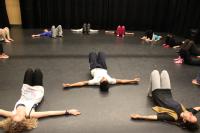Ensemble Praxis
Thomas Docherty, in his Preface to our recent Open-Space Learning publication, available online at Bloomsbury Academic, ‘recognises that play is central to learning’ which opens up the possibility of inter-disciplinary behaviours. He asks:
Who would have thought that we could energize the budding lawyer, the chemist in her laboratory, by getting them out of the courtroom or lab and into the open space to which the actor is more accustomed? And what happens when scientists and lawyers meet not just each other, but also medics and literature students in the same space?
How does an atom behave? To a student of Chemistry, that can be a formula; but it can also be a thing of beauty, an action, and occupation of a dynamic space or environment wherein explosions happen, wherein floods take place; and to learn this is to find out what we are in education for. [v-vii]
Docherty views our practice as inter-disciplinary and, crucially, as founded on theories of play, where ‘there is no real divide between the realm of the mind and the realm of material history, likewise the practitioners in this book show us that the divisions between disciplines are purely provisional.’ One such practitioner, our PI Jonothan Neelands, ‘analyses the core idea of ‘ensemble’ as a bridging metaphor between the rehearsal room, the classroom and OSL in the context of higher education’. He cites Michael Boyd’s ‘set of values and behaviours which he considers to be the foundations of the ensemble’:
Cooperation / Altruism / Trust / Empathy / Imagination / Compassion / Tolerance / Forgiveness / Humility / Magnanimity / Rapport / Patience / Rigour [pp.81-2]
These should be the core values of any theatrical ensemble, but they can also be applied to the classroom and even the laboratory. For more academic reflections on the notion of the student ensemble, please refer to the above publicaton.
For for information about the ensemble, please email Jonathan.Heron@warwick.ac.uk

